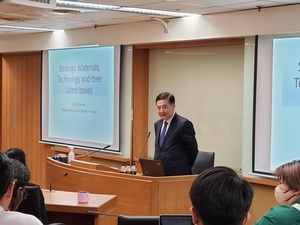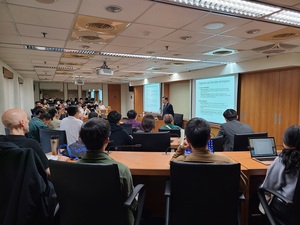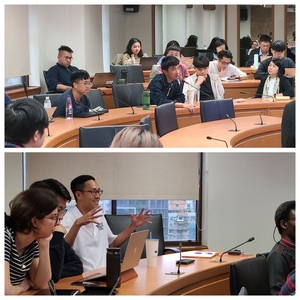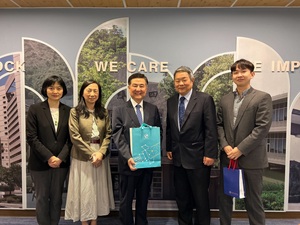IDAS Series: Strategic Materials, Technology and Their Latest Issues




Date :
2024-04-24
Department :
International Doctoral Program in Asia-Pacific Studies
【Article by IDAS】
National Chengchi University’s (NCCU) International Doctoral Program on Asia-Pacific Studies (IDAS) lecture series presented Strategic Materials, Technology and Their Latest Issues, held on 9 April 2024. Dr. Lee Eun-Ho, the Representative of the Korean Mission in Taipei, presented a historical overview of the contribution of key technologies to the destiny of empires of the past, with a view toward its relevance to strategic national resources in the current geopolitical climate of East Asia.
Representative Lee’s presentation focused on science as a means of building strategic sources of power either through economic means or direct military capacity. Furthermore, science presents the ability to overcome imposed resource scarcity through embargoes and sanctions. This means developing a population with the skill set and knowledge to synthesize alternative resources to meet industrial needs for the production of critical materials, such as chemicals and components for the production of semiconductors and artificial intelligence.
The historical survey presents the indispensable and inseparable relationship between scientific advancement and military superiority. As Representative Lee related these issues to the current challenges facing his own country, South Korea, and Taiwan, he pointed to the needed return for comprehensive industrial policy in order to safeguard critical technology and secure scarce materials for industries as a national imperative. At the conclusion of his talk, Representative Lee directed attention to the security of supply chains and the need for global cooperation, as shortages in produce and goods have long, unforeseeable consequences to national and international stability.
In the open forum, Representative Lee responded to questions from students, faculty, and guests with a strong emphasis on the effectiveness of sanctions and blacklisting of specific nations. He responded by saying that banning as a strategy is not a long-term solution, as it inspires target countries to innovate in creating alternative materials or finding new suppliers. Shortages in certain strategic resources cause the development of new industries. He also noted that in the current global environment, for nations such as South Korea and Taiwan to remain competitive, collaboration with other countries is a necessity – as maintaining a technological edge in the future is uncertain.
Representative Lee's presentation didn’t only look back at history to understand the importance of resources and technology from a broader perspective, it also raised important issues for consideration as both Taiwan and the wider region face an increasing prospect of conflict. It was a great opportunity for IDAS to have the Korean Representative to Taipei presenting on a topic of growing relevance to the region and gain insight as to how national power and science are interlinked with international politics.
National Chengchi University’s (NCCU) International Doctoral Program on Asia-Pacific Studies (IDAS) lecture series presented Strategic Materials, Technology and Their Latest Issues, held on 9 April 2024. Dr. Lee Eun-Ho, the Representative of the Korean Mission in Taipei, presented a historical overview of the contribution of key technologies to the destiny of empires of the past, with a view toward its relevance to strategic national resources in the current geopolitical climate of East Asia.
Representative Lee’s presentation focused on science as a means of building strategic sources of power either through economic means or direct military capacity. Furthermore, science presents the ability to overcome imposed resource scarcity through embargoes and sanctions. This means developing a population with the skill set and knowledge to synthesize alternative resources to meet industrial needs for the production of critical materials, such as chemicals and components for the production of semiconductors and artificial intelligence.
The historical survey presents the indispensable and inseparable relationship between scientific advancement and military superiority. As Representative Lee related these issues to the current challenges facing his own country, South Korea, and Taiwan, he pointed to the needed return for comprehensive industrial policy in order to safeguard critical technology and secure scarce materials for industries as a national imperative. At the conclusion of his talk, Representative Lee directed attention to the security of supply chains and the need for global cooperation, as shortages in produce and goods have long, unforeseeable consequences to national and international stability.
In the open forum, Representative Lee responded to questions from students, faculty, and guests with a strong emphasis on the effectiveness of sanctions and blacklisting of specific nations. He responded by saying that banning as a strategy is not a long-term solution, as it inspires target countries to innovate in creating alternative materials or finding new suppliers. Shortages in certain strategic resources cause the development of new industries. He also noted that in the current global environment, for nations such as South Korea and Taiwan to remain competitive, collaboration with other countries is a necessity – as maintaining a technological edge in the future is uncertain.
Representative Lee's presentation didn’t only look back at history to understand the importance of resources and technology from a broader perspective, it also raised important issues for consideration as both Taiwan and the wider region face an increasing prospect of conflict. It was a great opportunity for IDAS to have the Korean Representative to Taipei presenting on a topic of growing relevance to the region and gain insight as to how national power and science are interlinked with international politics.


 Fax:886-2-29379611
Fax:886-2-29379611